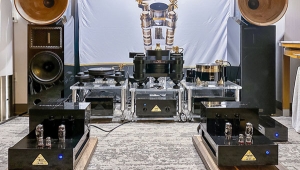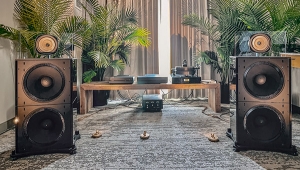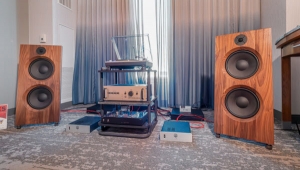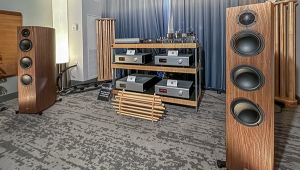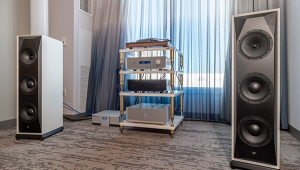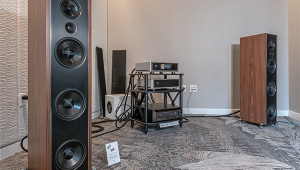| Columns Retired Columns & Blogs |
Resistance Is Futile
The mechanical toys were very superior, and looked down upon every one else; they were full of modern ideas, and pretended they were real.—Margery Williams, The Velveteen Rabbit
Music lovers listen to songs about trains. Audiophiles listen to trains.
At least that's how it was at the dawn of the stereo age, when record stores did brisk business in titles like Sounds in Space and Hear the Whistle Blow, and a portion of the nascent audiophile community made no bones about being less interested in the deeper meaning of music than in the sound on its surface—or in the meek thrill of hearing trains zizz from the left speaker to the right, for that matter.
Fifty years later, things have changed a little: Music lovers buy torch songs from their favorite singers—Bessie, Billie, whomever—because that's what they want to hear. Audiophiles buy the same songs from Jacintha because they're well recorded.
I used to look down on those audiophiles, but I don't anymore. I've stopped condescending to people who enjoy recordings differently from the way I do, because I no longer think there's any one approach that has a greater degree of legitimacy than any other.
I still prefer my own path to audio bliss: I want the music in my home to have a sense of flow and momentum, and I want all the texture, presence, and sense of scale I can get—and I'm willing to sacrifice a certain amount of timbral neutrality in order to be faithful to those other, more important criteria. But I know that my approach is "better" only inasmuch as it's the one I've worked out for myself, howsoever subconsciously, and while it allows me to internalize and enjoy the art of music to my own satisfaction, that's all that it does. Art isn't truth, it's freedom from truth: It's the ultimate in relativism, and any approach to disseminating art that seeks to confound that notion is doomed to irrelevance.
That's the key: Dissemination. Reproduction. That's where all the universals, all the absolutes, break down.
The philosopher Walter Benjamin wrote, "The technology of reproduction detaches the reproduced object from the domain of tradition." Years later, in a decidedly more electric age, media analyst Marshall McLuhan seemed to expand on that idea, saying of the technology of communication, "Its message is total change. . . . you can't go home again." Writing specifically about domestic audio, McLuhan also said that the phonograph "broke down the walls of the music hall," which was taken by many to be a good thing—like tearing down the walls of the bank, or the place where they make Miller Lite. My own conclusion is different, and predictably negative: Phonography didn't democratize the concert hall—it demolished it altogether.
An original work is inseparable from the time and the place of its making, and that applies to the concert hall performance as well. Yet the very act of recording a performance and playing it back at another place and another time defies that axiom, and reduces music to little more than sound—and most of whatever scraps of meaning that are left hanging on its bones are of the listener's own making. (As Benjamin also said, "Phonograph records enable the original to meet the beholder halfway"—my emphasis.) When I listen to Wilhelm Furtwängler's 1953 Radio Italiana recording of Wagner's Das Rheingold, I can't help associating it with certain other things in my life: people, books, scents, furniture. And somewhere in the cognitive background I compare it with other Rheingolds—a notion that I'm sure would horrify Furtwängler himself. Or Wagner. The concept of a modern listener actively cataloguing the flow of differences among dozens of interpretations of a single work while he listens is surely not what anyone had in mind.
There you go: A moment of creation at one end of the line and a perversion of intent at the other. But it's what we do. It's unavoidable. It isn't good or bad, it just is. Resistance is futile.
If not for sound recordings and playback equipment, both occupying various strata of technical and artistic accomplishment, how could I ever hear a Wagner opera in Cherry Valley, New York? How could I hear Caruso, or Mahler's piano rolls, or Dylan tangling with a heckler in Manchester? And what about music that never existed live? What about Pet Sounds or Sgt. Pepper's? What about that goofy Cage piece with all the record players lined up on stage?
All of those experiences are worthy; all of them are legitimate. But their worth is removed from any concept of an "original performance," and now has at least as much to do with what the listener makes of it—relativism again. Absolutes—moral, scientific, you name it—govern the day-to-day universe, but art is another dimension altogether, and is largely immune to absolutes. So is its reproduction, because reproduction is re-creation on a personal level.
As I grow older, the futility of writing about soundstage depth and microdynamics and caramel colorations becomes more and more apparent. I want to carry on sharing my own enthusiasm for recorded art and for the technology that enables it, but at the same time I want to remind you that all of these things should be different for each individual listener. You can share the enjoyment, I think, without taking the specifics too seriously, without getting bogged down in all the ephemera. You can forget bass or imaging or even flow or momentum, as long as you recognize the things that trigger your own release from the mundane.
I'm often first in line to poke fun at our hobby—to laugh at the foibles and character traits, my own included, that lead grown men to sit in front of a speaker while the house, any house, crumbles around them. I'm no less inclined to do that now, but I also want to say that What we're doing is all right. As great original works of musical art seem less and less likely to happen, and as our culture sloughs closer to the basin wherein serious music appreciation is abandoned in favor of the constant background wash of sonic product, we're right to hold out and defend the art of listening as the necessary complement to the art of performing. We do it not because it sounds real—it couldn't possibly, no matter what—and not because it even sounds good. We do it because it's art, and that makes us real. That's what matters most—except to people who don't understand.
- Log in or register to post comments
















